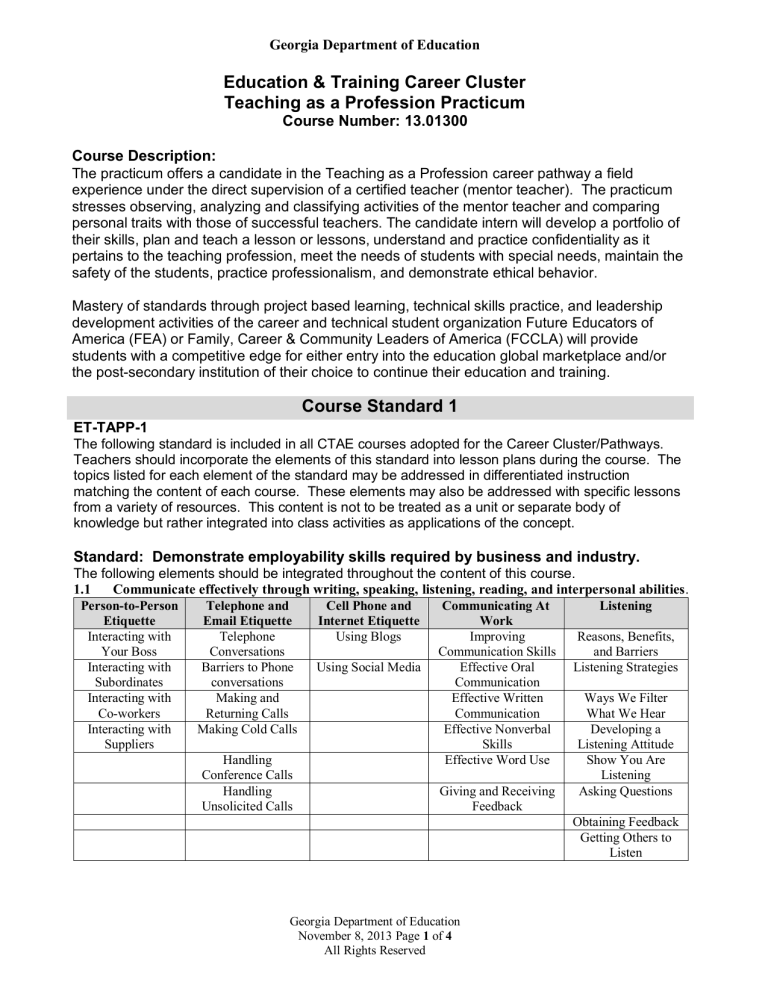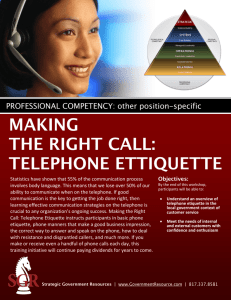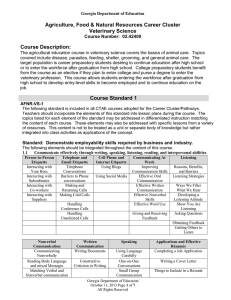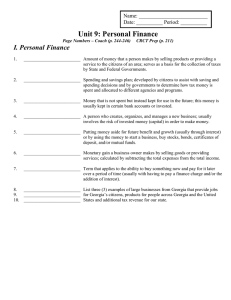
Georgia Department of Education
Education & Training Career Cluster
Teaching as a Profession Practicum
Course Number: 13.01300
Course Description:
The practicum offers a candidate in the Teaching as a Profession career pathway a field
experience under the direct supervision of a certified teacher (mentor teacher). The practicum
stresses observing, analyzing and classifying activities of the mentor teacher and comparing
personal traits with those of successful teachers. The candidate intern will develop a portfolio of
their skills, plan and teach a lesson or lessons, understand and practice confidentiality as it
pertains to the teaching profession, meet the needs of students with special needs, maintain the
safety of the students, practice professionalism, and demonstrate ethical behavior.
Mastery of standards through project based learning, technical skills practice, and leadership
development activities of the career and technical student organization Future Educators of
America (FEA) or Family, Career & Community Leaders of America (FCCLA) will provide
students with a competitive edge for either entry into the education global marketplace and/or
the post-secondary institution of their choice to continue their education and training.
Course Standard 1
ET-TAPP-1
The following standard is included in all CTAE courses adopted for the Career Cluster/Pathways.
Teachers should incorporate the elements of this standard into lesson plans during the course. The
topics listed for each element of the standard may be addressed in differentiated instruction
matching the content of each course. These elements may also be addressed with specific lessons
from a variety of resources. This content is not to be treated as a unit or separate body of
knowledge but rather integrated into class activities as applications of the concept.
Standard: Demonstrate employability skills required by business and industry.
The following elements should be integrated throughout the content of this course.
1.1
Communicate effectively through writing, speaking, listening, reading, and interpersonal abilities.
Person-to-Person
Telephone and
Cell Phone and
Communicating At
Listening
Etiquette
Email Etiquette
Internet Etiquette
Work
Interacting with
Telephone
Using Blogs
Improving
Reasons, Benefits,
Your Boss
Conversations
Communication Skills
and Barriers
Interacting with
Barriers to Phone
Using Social Media
Effective Oral
Listening Strategies
Subordinates
conversations
Communication
Interacting with
Making and
Effective Written
Ways We Filter
Co-workers
Returning Calls
Communication
What We Hear
Interacting with
Making Cold Calls
Effective Nonverbal
Developing a
Suppliers
Skills
Listening Attitude
Handling
Effective Word Use
Show You Are
Conference Calls
Listening
Handling
Giving and Receiving
Asking Questions
Unsolicited Calls
Feedback
Obtaining Feedback
Getting Others to
Listen
Georgia Department of Education
November 8, 2013 Page 1 of 4
All Rights Reserved
Georgia Department of Education
Nonverbal
Communication
Communicating
Nonverbally
Reading Body Language
and mixed Messages
Matching Verbal and
Nonverbal communication
Improving Nonverbal
Indicators
Nonverbal Feedback
Showing Confidence
Nonverbally
Showing Assertiveness
1.2
Written
Communication
Writing Documents
Constructive
Criticism in Writing
Speaking
Using Language
Carefully
One-on-One
Conversations
Small Group
Communication
Large Group
Communication
Making Speeches
Involving the
Audience
Answering Questions
Visual and Media Aids
Errors in Presentation
Applications and Effective
Résumés
Completing a Job Application
Writing a Cover Letter
Things to Include in a Résumé
Selling Yourself in a Résumé
Terms to Use in a Résumé
Describing Your Job Strengths
Organizing Your Résumé
Writing an Electronic Résumé
Dressing Up Your Résumé
Demonstrate creativity by asking challenging questions and applying innovative procedures and
methods.
Teamwork and Problem Solving
Meeting Etiquette
Thinking Creatively
Preparation and Participation in Meetings
Taking Risks
Conducting Two-Person or Large Group Meetings
Building Team Communication
Inviting and Introducing Speakers
Facilitating Discussions and Closing
Preparing Visual Aids
Virtual Meetings
1.3
Exhibit critical thinking and problem solving skills to locate, analyze and apply information in
career planning and employment situations.
Problem
Customer Service
The Application Process
Interviewing
Finding the Right
Solving
Skills
Job
Transferable
Gaining Trust and
Providing Information,
Preparing for an
Locating Jobs and
Job Skills
Interacting with
Accuracy and Double
Interview
Networking
Customers
Checking
Becoming a
Learning and Giving
Online Application
Questions to Ask in
Job Shopping
Problem Solver
Customers What
Process
an Interview
Online
They Want
Identifying a
Keeping Customers
Following Up After
Things to Include in
Job Search
Problem
Coming Back
Submitting an Application
a Career Portfolio
Websites
Becoming a
Seeing the
Effective Résumés:
Traits Employers
Participation in Job
Critical Thinker
Customer’s Point
are Seeking
Fairs
Managing
Selling Yourself and Matching Your Talents to
Considerations
Searching the
the Company
a Job
Before Taking a Job
Classified Ads
Handling Customer
When a Résumé Should
Using Employment
Complaints
be Used
Agencies
Strategies for
Landing an
Customer Service
Internship
Staying Motivated
to Search
Georgia Department of Education
November 8, 2013 Page 2 of 4
All Rights Reserved
Georgia Department of Education
1.4
Model work readiness traits required for success in the workplace including integrity, honesty,
accountability, punctuality, time management, and respect for diversity.
Workplace Ethics
Personal
Employer
Business Etiquette
Communicating at
Characteristics
Expectations
Work
Demonstrating
Demonstrating a
Behaviors
Language and
Handling Anger
Good Work Ethic
Good Attitude
Employers Expect
Behavior
Behaving
Gaining and
Objectionable
Keeping Information
Dealing with
Appropriately
Showing Respect
Behaviors
Confidential
Difficult Coworkers
Maintaining
Demonstrating
Establishing
Avoiding Gossip
Dealing with a
Honesty
Responsibility
Credibility
Difficult Boss
Playing Fair
Showing
Demonstrating Your
Appropriate Work
Dealing with
Dependability
Skills
Email
Difficult Customers
Using Ethical
Being Courteous
Building Work
Cell Phone Etiquette
Dealing with
Language
Relationships
Conflict
Showing
Gaining
Appropriate Work
Responsibility
Coworkers’ Trust
Texting
Reducing
Persevering
Understanding
Harassment
Copyright
Respecting
Handling
Social Networking
Diversity
Criticism
Making
Showing
Truthfulness a Habit
Professionalism
Leaving a Job
Ethically
1.5
Apply the appropriate skill sets to be productive in a changing, technological, diverse workplace
to be able to work independently and apply team work skills.
Expected Work Traits
Teamwork
Time Management
Demonstrating Responsibility
Teamwork Skills
Managing Time
Dealing with Information Overload
Reasons Companies Use Teams
Putting First Things First
Transferable Job Skills
Decisions Teams Make
Juggling Many Priorities
Managing Change
Team Responsibilities
Overcoming Procrastination
Adopting a New Technology
Problems That Affect Teams
Organizing Workspace and Tasks
Expressing Yourself on a Team
Staying Organized
Giving and Receiving Constructive
Finding More Time
Criticism
Managing Projects
Prioritizing Personal and Work Life
1.6
Present a professional image through appearance, behavior and language.
On-the-Job Etiquette
Person-to-Person Etiquette Communication Etiquette
Using Professional
Meeting Business
Creating a Good Impression
Manners
Acquaintances
Introducing People
Meeting People for the First
Keeping Phone Calls
Time
Professional
Appropriate Dress
Showing Politeness
Proper Use of Work Email
Business Meal Functions
Behavior at Work
Parties
Behavior at Conventions
International Etiquette
Proper Use of Cell Phone
Proper Use in Texting
Georgia Department of Education
November 8, 2013 Page 3 of 4
All Rights Reserved
Presenting Yourself
Looking Professional
Dressing for Success
Showing a
Professional Attitude
Using Good Posture
Presenting Yourself to
Associates
Accepting Criticism
Demonstrating
Leadership
Georgia Department of Education
Cross-Cultural Etiquette
Working in a Cubicle
Support of CTAE Foundation Course Standards and Georgia Standards of Excellence
L9-10RST 1-10 and L9-10WHST 1-10:
Georgia Standards of Excellence ELA/Literacy standards have been written specifically for
technical subjects and have been adopted as part of the official standards for all CTAE courses.
Course Standard 2
ET-TAPP-2
Create a portfolio demonstrating knowledge, skills and experiences from the Teaching as
a Profession Pathway.
2.1 Read and understand philosophies that undergird educational practice and compose a
personal philosophy of education.
2.2 Design a child guidance and behavior plan that includes consequences and rewards.
2.3 Research and evaluate four different classroom guidance (management) techniques that
are present in classrooms for children/adolescents.
2.4 Analyze a variety of assessments of student performance critiquing the purposes,
advantages and disadvantages of each method.
2.5 Identify and explain the components of an Individual Education Plan (IEP), an Individual
Family Services Plan (IFSP), an Early Intervention Plan (EIP) and a 504 plan.
2.6 Explain interventions and accommodations to use when working with children with
special needs.
2.7 Develop a Teacher Work Sample using Georgia Performance Standards and Common
Core Georgia Performance Standards to include learning goals, assessment plans,
instruction to meet learning goals, and a reflection of the lesson.
2.8 Create a chart that describes the liability insurance of the following educational
professional organizations: NAEYC, NEA, PAGE, and ACTE.
2.9 Summarize various methods of communication with parents and explain the importance
of confidentiality when discussing issues with parents.
2.10 Interview the mentor teacher on the school’s practice of collaborative planning.
2.11 Summarize the mentor school’s Emergency Plan.
2.12 Identify resources that are used in the school system for field trips and inviting speakers
from the community.
2.13 Identify the procedure for learning about a student’s ability through assessment and the
student’s permanent cumulative file.
2.14 Interview the school media specialist about copyright laws.
2.15 Summarize two recent articles where an educator was accused and convicted of
violating the Georgia Professional Standards Commission Code of Ethics for Educators.
2.16 Compose a brief paper to summarize your experience and how the experience has
influenced your plans to pursue education as a career.
Georgia Department of Education
November 8, 2013 Page 4 of 4
All Rights Reserved







